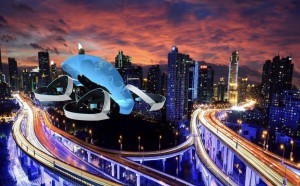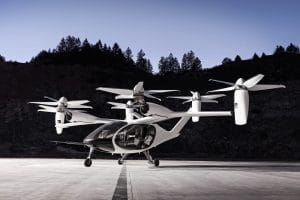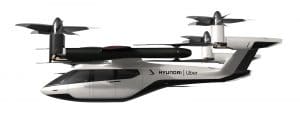Toyota Motor Corp, through its Toyota AI Ventures subsidiary, has invested $394 million in Joby Aviation to develop its electric vertical takeoff and landing vehicle for commercial air taxi service.
With Toyota’s investment, Shigeki Tomoyama, executive vice president of Toyota Motor Corp., will join Joby’s board of directors, officials said in a statement.
Joby Aviation is one of a number of startups that have raised nine-figure investments to develop the next generation of hardware used for urban air mobility. In fact, Uber announced a partnership with Hyundai during the recent Consumer Electronics Show.
(Hyundai, Uber partner on aerial taxis, show off full-scale model at CES)
Uber Elevate revealed its full-scale concept intended to handle trips of up to 60 miles at speeds of reaching 180 mph. But Toyota’s decision to invest in Joby raises its profile in what promises to be a highly competitive niche market.
The company’s air taxi solution revolves around an electric aircraft that looks like a consumer drone built at human scale. With a capacity of four passengers, the Joby aircraft has six propellers, a range of 150 miles and can fly up to 200 miles per hour. Right now, it’s still in experimental development.
It has developed a quiet, all-electric vertical takeoff and landing aircraft for air transportation services. A vertical takeoff and landing aircraft is able to hover, take off and land vertically, such as helicopters or the Bell Boeing V-22 Osprey military aircraft.
So far, Joby Aviation has raised $590 million in its latest round of funding, according to the company. The list of investors that also contributed to this funding round includes SPARX Group, Intel Capital, Capricorn Investment Group, JetBlue Technology Ventures and AME Cloud Ventures.
(Aston Martin wants to take to the air)

Toyota has put up $353,000 to help fund the Cartivator, a flying car concept being developed by a group of employees.
Joby and Toyota did not offer a timeframe for when they would have an operational vehicle. Hyundai expects to have its aircraft certified and in mass production by 2029 with prototypes in the skies before then. Other automakers have talked about producing some form of flying car, such as Aston Martin, as part of their ever-expanding mobility programs.
In fact, the tie-up with Joby isn’t even Toyota’s only exploration of flying cars. The industry giant invested $400,000 into a small Japanese tech firm, Cartivator Resource Management, in 2017. Cartivator is developing a single-seat flying car it hopes to have ready to demonstrate in time for the opening ceremonies at the Tokyo Olympic and Paralympic Games this summer.
Longer-term, Toyota itself is looking at what it describes as “aerial solutions.”
“Air transportation has been a long-term goal for Toyota, and while we continue our work in the automobile business, this agreement sets our sights to the sky,” said Toyota Motor Corporation President and CEO Akio Toyoda in a statement.
(Toyota could take to the air – starting with 2020 Tokyo Olympics)
“As we take up the challenge of air transportation together with Joby, an innovator in the emerging eVTOL space, we tap the potential to revolutionize future transportation and life. Through this new and exciting endeavor, we hope to deliver freedom of movement and enjoyment to customers everywhere, on land, and now, in the sky.”


